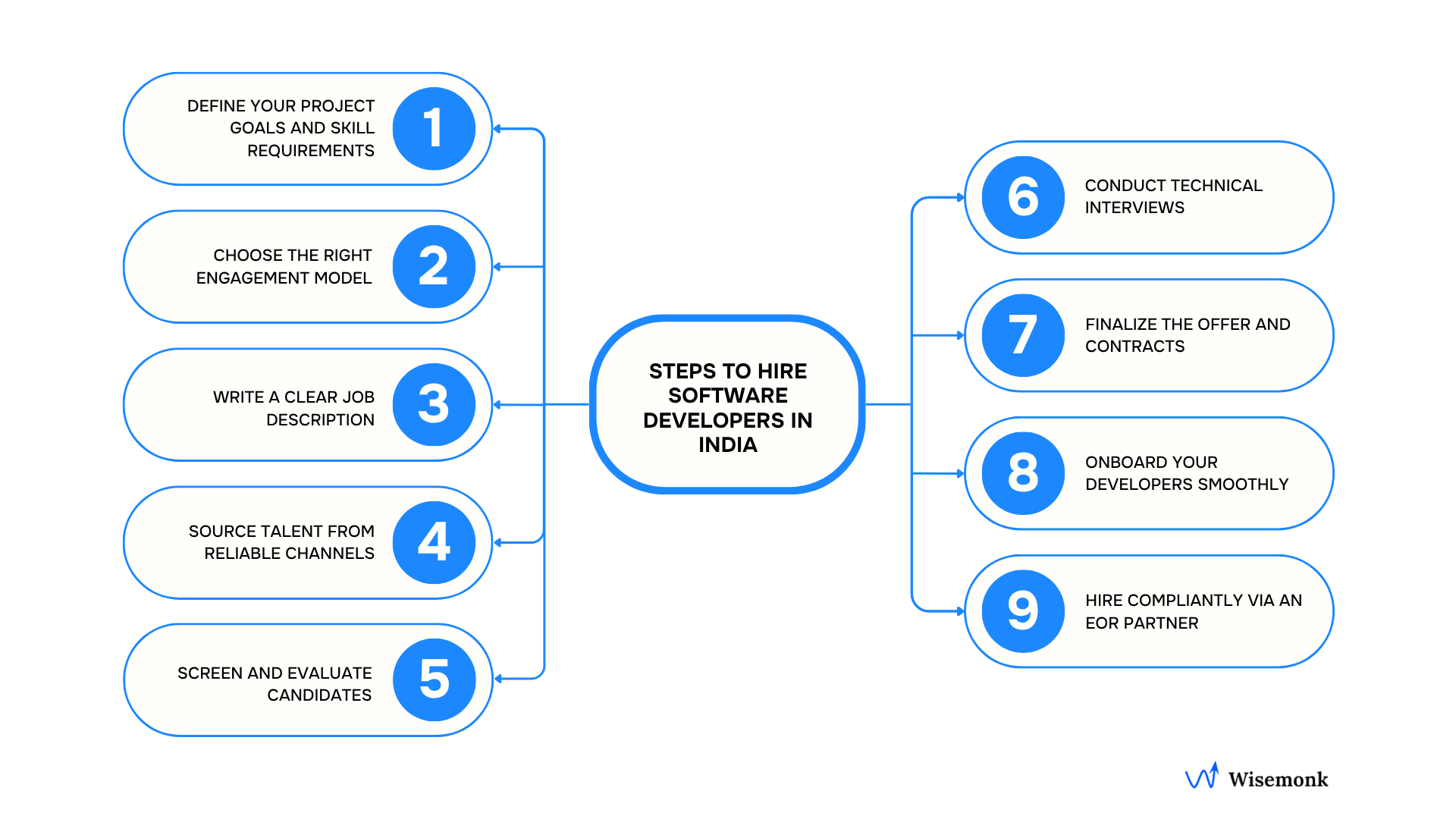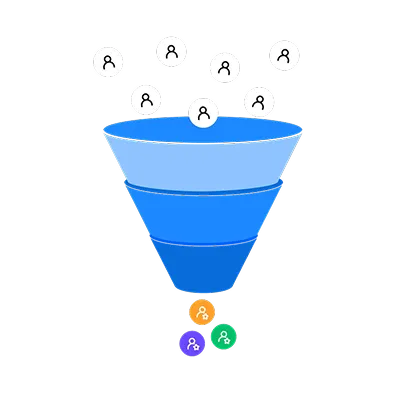If you’re planning to hire software developers in India but aren’t sure where to start, this practical guide is for you. We’ve created a practical, step-by-step resource to help global businesses find, evaluate, and hire top engineering talent in India, from identifying skill requirements to managing payroll and compliance. Whether you’re building your first offshore team or scaling an existing one, this guide will help you make confident, informed decisions that set your project up for success.
Why hire software developers in India?[toc=Why Hire Developers]
If you’re looking to scale your tech team fast without compromising quality, India is the best place to start. The country has become a global powerhouse for software development, offering world-class developers skilled in web, mobile, AI, and cloud technologies.
India’s software developers bring more than just technical expertise. They combine strong English communication skills, deep knowledge of various programming languages, and experience working with international clients across complex projects. Whether it’s a startup launching its first product or an enterprise expanding globally, Indian developers deliver software solutions that align with your business needs.
Here’s why global businesses prefer to hire software developers in India:
- Vast talent pool: Millions of skilled developers across all major tech stacks and domains.
- Diverse expertise: From full-stack and mobile app development to AI, blockchain, and SaaS product engineering.
- Time zone flexibility: Overlapping work hours with both the US and Europe enable seamless collaboration.
- Proven reliability: Indian developers have built and maintained products for Fortune 500 companies and fast-growing startups worldwide.
- Strong work ethic: A culture focused on problem-solving, innovation, and continuous learning.
From startups to Fortune 500s, development teams in India help companies innovate faster, ensure code quality, and scale efficiently while maintaining industry best practices and global collaboration standards.
What types of software developers can you hire in India?[toc=Types of Developers]
One of the biggest advantages of hiring in India is the sheer variety of skilled developers available. Whether you’re building a SaaS platform, scaling a mobile app, or launching a data-heavy AI product, India has professionals who specialize in every area of software development.
Here’s a quick look at the types of developers you can hire in India based on your project needs:
- Frontend Developers: Experts in frameworks like React, Angular, and Vue.js, they focus on creating clean, responsive user interfaces that make your product visually appealing and easy to navigate.
- Backend Developers: Proficient in Node.js, Python, Java, and .NET, these developers handle server-side logic, database design, and API integrations to ensure your app runs smoothly and securely.
- Full Stack Developers: The all-rounders. They work on both the frontend and backend, bringing efficiency to projects that need quick iterations and end-to-end ownership.
- Mobile App Developers: Skilled in iOS (Swift), Android (Kotlin), Flutter, and React Native, mobile developers from India can create custom, high-performance apps for global audiences.
- DevOps Engineers: Experts in AWS, Docker, Kubernetes, and CI/CD pipelines, they help automate infrastructure, speed up deployments, and improve scalability.
- QA and Automation Testers: Quality assurance engineers ensure code quality through continuous testing, bug tracking, and implementing stringent testing practices.
- Cloud and Data Engineers: From Azure and AWS to GCP and Snowflake, these engineers manage cloud migrations, data pipelines, and analytics for large-scale applications.
- Emerging Tech Specialists: India also has a growing pool of talent in AI/ML, blockchain, cybersecurity, AR/VR, and SaaS product engineering, making it easy to find specialists for innovative projects.
Whether you need a few dedicated developers or a full offshore team, India’s tech talent covers every skill set your project might require.
What skills should you look for in Indian software developers?[toc=Key Skills to Look For]
Hiring software developers in India gives you access to some of the most technically skilled and globally experienced professionals. But to make the right hire, you need to know what separates a good developer from a great one.
From our experience helping global businesses hire top engineers in India, here’s what you should look for when evaluating candidates:
Technical Skills
- Strong programming knowledge: Proficiency in relevant programming languages like Python, JavaScript, Java, C#, or Go depending on your project requirements.
- Hands-on experience with frameworks and tools: Familiarity with React, Node.js, Angular, Docker, Kubernetes, or AWS for modern software development.
- Code quality and architecture understanding: Developers who write clean, scalable, and well-documented code while ensuring long-term maintainability.
- Version control and CI/CD pipelines: Experience with Git, Jenkins, and other deployment tools to streamline the development process.
- Testing and QA mindset: Ability to implement unit tests, perform debugging, and ensure code reliability.
Soft Skills
- Strong communication skills: Indian developers are fluent in English, making collaboration with global teams seamless.
- Problem-solving ability: A proactive approach to identifying issues, suggesting solutions, and improving project efficiency.
- Team collaboration: Experience working in agile environments using tools like Jira, Notion, or Slack for real-time collaboration.
- Adaptability: Comfort with evolving tech stacks, project demands, and new programming environments.
- Ownership and accountability: Developers who take initiative and deliver on project timelines without micromanagement.
Bonus Skills That Add Value
- Cloud expertise: Knowledge of AWS, Azure, or Google Cloud platforms.
- DevOps and automation: Experience setting up CI/CD pipelines, Docker containers, and Kubernetes clusters.
- Data and analytics: Exposure to data pipelines, APIs, and performance optimization.
India’s top developers often come from product startups, tech unicorns, and global engineering teams, giving them both technical expertise and real-world problem-solving skills.
How to hire software developers in India? (step-by-step)[toc=Hiring Steps]
Hiring software developers in India can be simple and highly effective when you follow a structured process. The goal is to find skilled engineers who align with your business goals, communicate well, and deliver quality code on time.
Here’s a clear step-by-step approach we’ve seen work best for global businesses:

Step 1: Define Your Project Goals and Skill Requirements
Start by outlining your project scope, technology stack, and desired outcomes. Identify whether you need backend, frontend, mobile, or full-stack developers. Clarity at this stage ensures you hire the right experts for your project’s success.
Step 2: Choose the Right Engagement Model
Decide how you want to work with your developers: full-time employees, contract-based hires, or dedicated remote teams. Many global companies prefer hiring through Wisemonk to build compliant, long-term teams in India without opening a local entity.
Step 3: Write a Clear Job Description
Create a detailed tech brief mentioning required skills, programming languages, years of experience, and project responsibilities. Include information about your company culture, communication expectations, and tools used for collaboration.
Step 4: Source Talent from Reliable Channels
Use trusted sources like vetted job boards, LinkedIn, GitHub, and referral networks. You can also partner with EOR providers, who have pre-screened and verified developer networks across India’s top tech hubs.
Step 5: Screen and Evaluate Candidates
Test coding skills through live assessments or platforms like HackerRank and Codility. Evaluate problem-solving abilities, logic, and familiarity with your tech stack. Also, assess communication skills to ensure smooth collaboration with your global team.
Step 6: Conduct Technical Interviews
Use practical, scenario-based questions to test architecture thinking, debugging skills, and code review approach. You can also include a small project or pair programming session to evaluate real-world performance.
Step 7: Finalize the Offer and Contracts
Once you identify the right developer, prepare an offer outlining compensation, benefits, and expectations. Ensure the contract covers intellectual property rights, confidentiality, and compliance with Indian labor laws.
Step 8: Onboard Your Developers Smoothly
Set up access to project management tools, code repositories, and communication platforms like Slack or Notion. Introduce them to the in-house team and align on goals and reporting structure.
Step 9: Hire Compliantly via an EOR Partner
From our experience helping global companies build tech teams in India, the fastest and safest way to hire is through an Employer of Record (EOR). It handles payroll, taxes, contracts, and local compliance so you can focus entirely on development.
Following these steps ensures a simple, transparent, and risk-free hiring process. You’ll build a high-performing development team in India without legal or operational hurdles.
What is the cost of hiring software developers in India?[toc=Developer Cost in India]
Hiring software developers in India offers exceptional value not because it’s cheaper, but because the quality of engineering talent matches global standards at competitive rates. The cost varies based on experience, location, and the technologies required for your project.
Here’s a breakdown of average salary ranges for 2025:
Cost Drivers to Consider:
- City and region: Developers in Bengaluru, Pune, and Hyderabad typically earn more due to higher demand and living costs.
- Tech stack: Specialized skills like AI/ML, data engineering, or blockchain command higher pay than standard web or mobile development.
- Experience and seniority: Developers with product startup or enterprise experience tend to charge premium rates.
- Engagement model: Full-time employees, dedicated developers, and freelance developers all have different pricing structures.
- Project complexity: Custom software development or large-scale SaaS products involve more hours, integrations, and testing.
Even though salaries in India are lower compared to the US or Europe, the quality, innovation, and reliability are on par with global standards. Many global businesses now choose to hire software developers in India to balance speed, scale, and technical depth.
How to manage and retain developers in India?[toc=Manage and Retain Talent]
Hiring great developers is only half the job; keeping them engaged, productive, and motivated is what drives long-term success. India’s software engineers are known for their dedication and technical depth, but managing them effectively requires a thoughtful approach to onboarding, collaboration, and career growth.
Here’s how global companies can manage and retain their India development teams successfully:
- Onboard the Right Way: A smooth onboarding process builds confidence from day one. Set up payroll, benefits, and IT equipment in advance. Introduce developers to the company culture, project tools, and performance expectations. Localizing onboarding (including public holidays, policies, and work norms) helps them settle in faster.
- Enable Seamless Collaboration: Use project management tools like Jira, Asana, or Trello and communication tools like Slack or Microsoft Teams to stay connected. Regular standups, sprint reviews, and async updates make remote developers feel like part of your in-house team.
- Maintain Real-Time and Async Balance: India’s time zone overlaps conveniently with both the US and Europe. Schedule meetings during mutual working hours but also use async updates for flexibility and efficiency.
- Recognize and Reward Performance: Retention improves significantly when developers see growth and recognition. Offer performance-based bonuses, learning budgets, and regular feedback sessions to encourage ongoing improvement.
- Provide Clear Growth Pathways: Talented developers value opportunities to grow technically and professionally. Set up mentorship programs, promote ownership in projects, and involve them in product decisions to keep them engaged.
- Ensure Compliance and Timely Payroll: Developers appreciate reliability. Partnering with a trusted Employer of Record (EOR) ensures salaries, taxes, and benefits are handled seamlessly. This not only boosts trust but also reduces attrition caused by operational friction.
- Support Work-Life Balance: Encourage reasonable workloads, wellness benefits, and flexibility. Remote developers in India value autonomy and respect for their time.
When managed thoughtfully, India-based developers don’t just execute tasks, they become long-term contributors to your innovation and business growth.
What mistakes should you avoid when hiring developers in India?[toc=Common Hiring Mistakes]
Hiring developers in India can be incredibly rewarding, but there are a few common mistakes that can slow down your progress or affect code quality. Many global companies rush the process or skip key compliance steps, which can lead to communication issues, legal risks, or mismatched expectations.
Based on our experience helping global businesses hire and manage software developers in India, here are the biggest pitfalls to avoid:
- Skipping Clear Scope Definition: Unclear project goals or vague requirements lead to confusion and misalignment. Define your project’s scope, deliverables, and timelines before you start the hiring process.
- Underestimating Seniority Levels: Hiring junior developers for complex projects to save costs often backfires. Assess your project’s technical depth and choose developers who can deliver at the required level.
- Ignoring Technical Assessments: Never skip coding tests or technical interviews. Reviewing GitHub profiles, conducting live assessments, and checking past project experience ensures code quality and technical fit.
- Poor Communication and Feedback Loops: Without structured communication, even skilled developers can miss project alignment. Use project management tools like Jira, Notion, or Trello and set up regular standups for updates and feedback.
- Paying Through Informal Channels: Paying contractors directly or skipping compliance may lead to penalties and legal risks. Always use compliant payment methods or hire through an Employer of Record (EOR).
- Overlooking Cultural Nuances: India’s developers are highly adaptable, but building strong collaboration requires awareness of communication styles, work hours, and local holidays.
Avoiding these mistakes will help you hire better, build stronger relationships, and maintain top performance across your India team.
How can global companies hire software developers in India in a compliant manner?[toc=Compliant Hiring in India]
Hiring software developers in India opens the door to incredible talent, but doing it the wrong way can create serious compliance risks. Without a local entity, direct hiring may lead to issues with tax laws, employment classification, and intellectual property ownership.
That’s why global companies are increasingly partnering with Employer of Record (EOR) solutions to build compliant and scalable teams in India.
From our experience helping 500+ global businesses hire developers across India, here’s how the EOR model simplifies the entire process:
- Compliant Hiring Without a Local Entity: An EOR acts as the legal employer in India, so you can onboard and manage developers quickly without registering a company locally.
- Local Payroll and Benefits: Wisemonk ensures timely salary payments in INR, manages taxes (PF, ESI, income tax), and handles statutory benefits under Indian labor laws.
- Legal Contracts and IP Protection: All employment agreements, NDAs, and IP transfer clauses are handled according to Indian regulations to protect your business and product code.
- Simplified Onboarding and Offboarding: The entire process from offer letters to payroll setup is managed efficiently so your developers can focus on delivering great software from day one.
- Reduced Misclassification Risks: Hiring contractors directly can often blur legal lines. With an EOR, your developers are fully compliant employees, reducing risks with authorities and audits.
- Scalable Solution for Growing Teams: Whether you’re hiring one developer or an entire offshore team, the EOR model scales easily as your business grows.
What should be on your India hiring checklist?[toc=India Hiring Checklist]
Before you start building your development team in India, it’s important to have a clear checklist that covers every step from defining skills to ensuring compliance. A structured approach helps you hire faster, avoid legal risks, and set your developers up for long-term success.
Here’s a simple checklist to follow when hiring software developers in India:
Indian Developer Hiring Checklist
- Finalize skill requirements and project scope: List out the exact programming languages, frameworks, and tools your project demands. Identify whether you need backend, frontend, or full stack developers.
- Choose the right engagement model: Decide between hiring full-time employees, freelance developers, or a dedicated offshore team. Consider your long-term business needs and project timeline.
- Write a clear job description: Include role responsibilities, technical skills, and expected outcomes. Mention project management tools, communication expectations, and collaboration processes.
- Screen and interview thoroughly: Use coding assessments, live technical rounds, and problem-solving tests to ensure you hire skilled developers with strong code quality and analytical thinking.
- Select a compliant hiring partner: Work with an Employer of Record (EOR) to handle payroll, taxes, and contracts legally and seamlessly in India.
- Plan onboarding and equipment setup: Ensure developers have access to systems, credentials, and tools like GitHub, Jira, Slack, or Notion.
- Set up project management and communication workflows: Use tools like Asana, Trello, or Microsoft Teams to manage tasks, sprints, and real-time collaboration effectively.
- Define retention and performance plans: Establish review cycles, bonuses, and upskilling opportunities to keep your team engaged and motivated.
With this checklist, your hiring process becomes clear, compliant, and scalable, helping you onboard exceptionally productive engineers in India without the complexity of setting up a local entity.
Conclusion
Hiring software developers in India gives your business access to one of the world’s largest and most skilled tech talent pools. The right developers don’t just write code, they bring problem-solving skills, technical expertise, and a strong sense of ownership that drives real results. Whether you’re hiring one engineer or building an entire offshore team, focus on clarity, collaboration, and compliance. And if you want to simplify global hiring, Wisemonk can help you hire, pay, and manage software developers in India quickly and compliantly without setting up a local entity.
Ready to build your high-performing Software Engineers team in India? Contact us today to discuss your hiring needs!







































